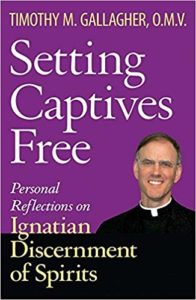Podcast: Play in new window | Download (Duration: 31:33 — 21.7MB) | Embed
Subscribe: Apple Podcasts | Spotify | Amazon Music | Android | Pandora | iHeartRadio | JioSaavn | Podchaser | Gaana | Podcast Index | Email | TuneIn | Deezer | Anghami | RSS | More
Dryness in Prayer: Is it Spiritual Desolation? – Spiritual Desolation: Be Aware, Understand, Take Action with Fr. Timothy Gallagher

Fr. Timothy Gallagher and Kris McGregor explore the experience of dryness in prayer and how to discern its meaning. Not all dryness is a sign of spiritual desolation; often it reflects healthy growth in prayer. For example, someone accustomed to structured meditation on scripture or the rosary may begin to feel drawn instead to a simpler, quieter presence with the Lord—similar to a couple content to sit together in silence. This simplification is not regression but a deepening of communion with God. At the same time, he stresses that prayer life is personal: for some, fidelity to a specific devotion like the rosary may remain the best path, while for others, God may invite new ways of relating. He emphasizes freedom, discernment, and, when possible, the help of a spiritual director.
Fr. Gallagher also addresses other sources of dryness. Sometimes it arises because we have not yet shared deep burdens or pain with God, as in the story of a man whose prayer dried up after his son’s death until he finally opened that wound in prayer. Other times, it may come from physical fatigue or emotional depletion—natural causes that require rest, not guilt. These kinds of dryness differ from true spiritual desolation, which includes discouragement, loss of hope, and temptations. He also touches on tears as a grace in spiritual consolation, a bodily expression of joy in God’s closeness, which should be received without shame.
Discerning Hearts Reflection Questions:
- When prayer feels dry, do I pause to ask whether God may be inviting me into a simpler, more silent communion with Him?
- Do I give myself the freedom to follow the movement of the Spirit in prayer, or do I cling rigidly to familiar forms out of fear or guilt?
- What burdens or unspoken pains am I hesitant to share with God, and how might opening these to Him deepen my prayer?
- Do I sometimes project human weakness or judgment onto God the Father, instead of trusting His unchanging love and mercy?
- How do I respond when physical exhaustion or emotional strain affects my prayer—do I approach it with patience and humility?
- Have I experienced tears of spiritual consolation, and if so, do I receive them as God’s gift rather than something to suppress?
- In moments of dryness, do I discern whether I am facing true spiritual desolation or simply a natural stage in my growth?
- How can I seek guidance from spiritual direction or trusted counsel to better recognize God’s invitations in my prayer life?

From Setting the Captives Free: Personal Reflections on Ignatian Discernment of Spirits:
“Dryness may again result when persons need to share with God a burden, fear, shame, or anxiety that fills their hearts— and have as yet been unable to do so. They experience dry- ness: nothing seems to help in prayer, the time passes slowly and with distractions, and the prayer they attempt appears to lack life.
A husband and wife sit across the table from each other at dinner. He knows that she holds a burden in her heart that she has not been able to express and share with him. Until the burden is expressed and shared, they will struggle to speak together with their habitual ease and communion. Their conversation will remain on a superficial level—it will feel dry—while both know that something deeper needs to be communicated. A man once told me that for eleven years his prayer had been dry. A few questions revealed that his young son had died eleven years earlier. When, after some hesitancy and with some courage, he shared with the Lord the stored- up pain and anger in his heart, the dryness ceased, and prayer flowed again.
Other Forms of Dryness
Other forms of dryness may result from nonspiritual factors. When persons are physically exhausted, they may find their prayer dry: they simply do not have the physical energy to pray in their usual way. Adequate rest will resolve this “dryness.” Something similar may result from depletion of emotional energy. Persons who have expended great emotional energy in difficult situations and who try to pray may also find that their prayer is dry: they are affectively spent and struggle to be emotionally present to their prayer. Healthy ways of replenishing emotional energy will resolve this “dry- ness” as well.
None of these forms of dryness are experiences of spiritual desolation.23 Each has its individual cause and so its indi- vidual remedy. Good spiritual direction will be sensitive to the cause of such persons’ individual experiences of dryness and so assist them to respond appropriately, helping them to eliminate its cause or—should such “dryness” indicate growth toward simplified prayer—assisting them to negotiate it well.
If, however, the dryness bears the mark of spiritual des- olation—affective aridity coupled with discouragement, a sense of distance from God, a weakening of hope, various temptations, and the like—then such persons will recognize the enemy at work and hear the call to active and energetic resistance.”
Father Timothy M. Gallagher, O.M.V., was ordained in 1979 as a member of the Oblates of the Virgin Mary, a religious community dedicated to retreats and spiritual formation according to the Spiritual Exercises of St. Ignatius. Fr. Gallagher is featured on the EWTN series “Living the Discerning Life: The Spiritual Teachings of St. Ignatius of Loyola”. For more information on how to obtain copies of Fr. Gallaghers’s various books and audio which are available for purchase, please visit his website: frtimothygallagher.org


